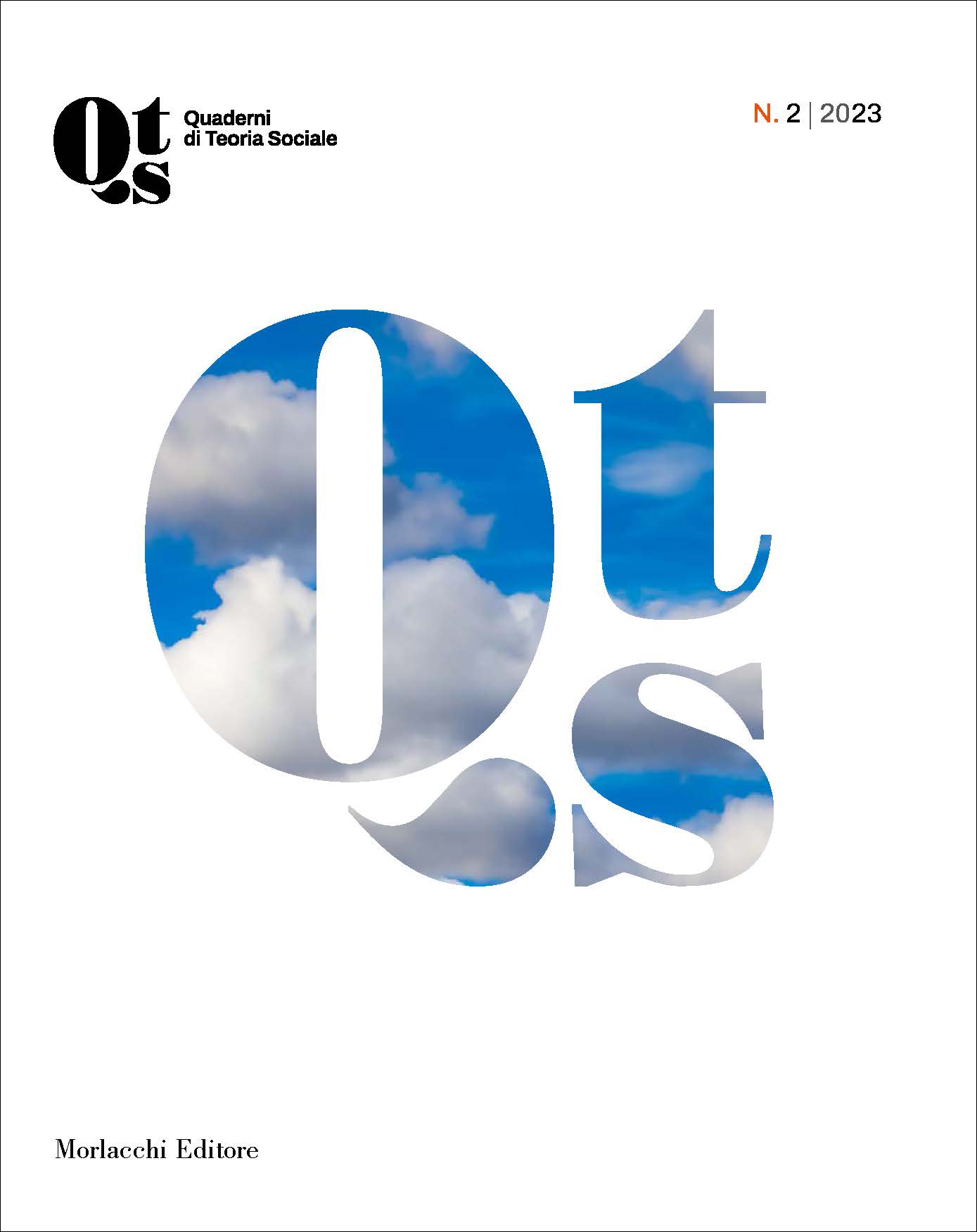Cesare Beccaria and the Lombard Enlightenment in the Sociological Thought of Moses Dobruska
DOI:
https://doi.org/10.57611/qts.v2i2.297Parole chiave:
History of Sociology, Moses Dobruska, Cesare BeccariaAbstract
The aim of this article is to analyse the influence of the theoretical-philosophical framework elaborated by the Milanese Enlightenment philosopher Cesare Beccaria (1738-1794), in the volume On Crimes and Punishments (1764), on the sociological thought of Moses Dobruska (1754-1793) and in particular his main work, the Philosophie sociale, published in 1793 in revolutionary Paris. Dobruska, a founding father of sociology forgotten for two centuries, inspired Henri de Saint-Simon (1760-1825) and later Auguste Comte (1798-1857). The article highlights both similarities and differences in the theoretical approaches and intentions between the two authors, delving into the themes of deviance, transgression of norms, sanctions as well as the ultimate goal of society, which Beccaria aspires to reform, and which Dobruska instead wants to revolutionise. The aim of Beccaria’s philosophical essay is to rationalise the penal system in order to reduce unhappiness in the Duchy of Milan. Dobruska incorporates the reforms of the judicial system elaborated by Beccaria, albeit with some alterations. As a forerunner of sociological thinking, he is, however, more interested in investigating the inclinations of the deviant person and the structural processes that hinder deviance or those that support it. In preparation for a democratic society after the abolition of the Ancien Régime, Dobruska reflects on the social and cultural determinants of happiness.
Riferimenti bibliografici
Aron R., 1967, Les étapes de la pensée sociologique. Montesquieu, Comte, Marx, Tocqueville, Durkheim, Pareto, Weber, Gallimard, Paris.
Audegean, P., 2014, Cesare Beccaria, filosofo europeo, Carocci, Roma, 2014 (ed. or. 2011).
Beccaria, C., 1995 On Crimes and Punishments. Cambridge University Press, Cambridge (ed. or. it. 1764).
- 1804, Elementi di economia pubblica, Destefanis, Milano.
Buchholz, K., 2023, Which States Have Death Penalty, Statista, https://www.statista.com/chart/20053/death-penalty-by-us-state/
Burgio, A., 1996, Tra diritto e politica. Note sul rapporto Beccaria-Montesquieu, Rivista di Storia della Filosofia, n. 51, pp. 659-676.
Cerulo, M., 2014, La società delle emozioni. Teorie e studi di caso tra politica e sfera pubblica, Orthotes Editrice, Nocera Inferiore.
Davies, J. C., 1965, The Family’s Role in Political Socialization, The Annals of the American Academy of Political and Social Science, vol. 361, 10-19.
De Luise, F., Farinetti G., 2010, Lezioni di storia della filosofia, vol. B., Zanichelli, Bologna.
Del Bo, D., 1939, I primi critici di Cesare Beccaria, Rivista di Filosofia Neo-Scolastica, vol. 31, n. 2, pp. 145-173.
Dobruska M./Frey J., 1793, Philosophie sociale dédiée au peuple François par un Citoyen de la Section de la République Françoise, ci-devant du Roule, Froullé, Paris.
Dominicis De, F., 1911, I delitti e le pene, di Cesare Beccaria e il loro fondamento sociale, Rivista Internazionale di Scienze Sociali e Discipline Ausiliarie, vol. 55, n. 219, pp. 355-71.
Foucault, M., 1975, Surveiller et punir. Naissance de la prison, Gallimard, Paris.
Funston J., Funston R., 1976, Cesare Beccaria and The American Founding Fathers, Italian Americana, vol. 3, n. 1, pp. 72-92.
Greco, S., 2023, Hope in the Sociological Thoughts of Some Founding Fathers, The American Sociologist, n. 54, pp. 56-75.
- 2022, Moses Dobruska and the Invention of Social Philosophy. Utopia, Judaism, and Heresy under the French Revolution, De Gruyter, Berlin.
- 2021, Il sociologo eretico. Moses Dobruska e la sua Philosophie sociale (1793), Giuntina, Firenze.
Hobbes, T., 1904, Leviathan or the Matter, Forme & Power of a Commonwealth, Ecclesiasticall and Civil, University Cambridge Press, Cambridge (ed. or. 1651).
Honneth, A., 1994, Pathologien des Sozialen: Die Aufgaben der Sozialphilosophie, Fischer, Berlin.
Lee, S. J., 2022, Determinants of Happiness. In: Lee, Seung Yong, Public Happiness. Community Quality-of-Life and Well-Being, Springer, Cham, pp. 105-142.
Maestro, M., 1973, A Pioneer for the Abolition of Capital Punishment: Cesare Beccaria, Journal of the History of Ideas, vol. 34, n. 3, pp. 463-68.
Macaluso, M., Tumminelli, G., 2018, Socializzazione politica: una ricerca partecipativa su due casi di studio di Palermo, Studi di Sociologia, vol. 56, n. 4, pp. 423-44.
Mathias, M. D., 2013, The sacralization of the individual: human rights and the abolition of the death penalty, American Journal of Sociology, vol. 118, n. 5, pp. 1246-83.
Mauri, A., 1931, Pietro Verri riformatore, Rivista Internazionale Di Scienze Sociali e Discipline Ausiliarie, vol. 2, n. 5, pp. 513-52.
Mirri, M., Beccaria, C., 1960, Una Lettera del Beccaria nel suo testo originale, Studi Storici, vol. 1, n. 2, pp. 318-30.
Montesquieu de, C.-L., 2014, Tutte le opere (1721-1754), edited by D. Felice, Giunti, Milano.
Ono, H., Schultz Lee, K., 2013, Welfare states and the redistribution of happiness, Social Forces, vol. 92, n. 2, pp. 789-814.
Rampazi, M., 1977, La socializzazione politica e il problema delle generazioni, Il Politico 42, no. 3, pp. 571-86.
Romagnoli, S. (a cura di), 1960, Il Caffé ossia brevi e vari discorsi distribuiti in fogli periodici, Feltrinelli, Milano.
Rush M., 2007, La socializzazione politica, in M. Rush, Politica e società, il Mulino, Bologna, pp. 111-129.
Santato, G., 1996, La questione attributiva del ‘Dei Delitti e delle Pene, Lettere Italiane, vol. 48, n. 3, pp. 360-98.
##submission.downloads##
Pubblicato
Fascicolo
Sezione
Licenza
Copyright (c) 2023 Silvana Greco

Questo lavoro è fornito con la licenza Creative Commons Attribuzione - Non commerciale 4.0 Internazionale.
<a rel="license" href="http://creativecommons.org/licenses/by-nc/4.0/"><img alt="Licenza Creative Commons" style="border-width:0" src="https://i.creativecommons.org/l/by-nc/4.0/88x31.png" /></a><br />Quest'opera è distribuita con Licenza <a rel="license" href="http://creativecommons.org/licenses/by-nc/4.0/">Creative Commons Attribuzione - Non commerciale 4.0 Internazionale</a>.






